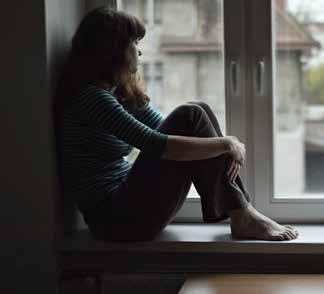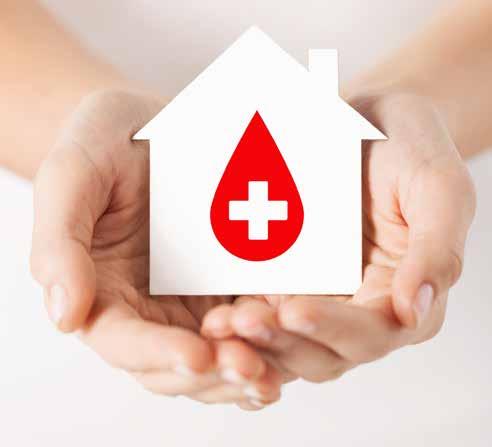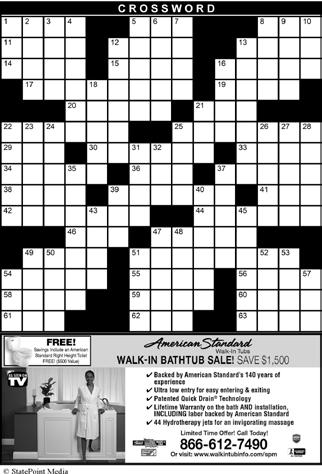
9 minute read
Community
STOP THE SPREAD OF COVID-19! LEARN HOW TO TAKE CARE OF YOURSELF AND OTHERS AT HOME.
WHAT ARE THE SYMPTOMS OF COVID-19? • The most common symptoms are fever, cough, sore throat and shortness of breath. Other symptoms include feeling achy, loss of taste or smell, headache, and diarrhea. • Most people with coronavirus disease 2019 (COVID-19) will have mild or moderate symptoms and can get better on their own.
Advertisement
WHO IS MOST AT RISK FOR SERIOUS ILLNESS? • People age 50 or older (people age 65 or older are at the highest risk) • People who have other health conditions, such as:
Lung disease Asthma Heart disease Obesity Diabetes Kidney disease Liver disease Cancer A weakened immune system
If you are sick with COVID-19 symptoms, assume you have it. When you are sick: • If you have trouble breathing, pain or pressure in your chest, are confused or cannot stay awake, or have bluish lips or face, call 911 immediately. • Call your doctor if you are age 50 or older or have a health condition that puts you at increased risk, or if you do not feel better after three days. • Always contact a doctor or go to the hospital if you have severe symptoms of COVID-19 or another serious health issue. • Do not leave your home except to get necessary medical care or essential food or supplies (if someone cannot get them for you). • If you must leave your home:
Avoid crowded places. Stay at least 6 feet from others. Cover your nose and mouth with a bandana, scarf or other face covering. Wash your hands before you go out, and use alcohol-based hand sanitizer while outside. • Household members can go out for essential work and needs but should monitor their health closely. If you or someone in your home is sick: • Create physical distance:
Do not have visitors. WHAT SHOULD I DO IF I GET SICK
WITH COVID-19 SYMPTOMS?
Stay at least 6 feet from others. Sleep head-to-toe if you share a bed with someone who is sick, or sleep on the couch. Keep people who are sick separate from those at risk for serious illness. • Cover up:
Cover your nose and mouth with a bandana, scarf or other face covering when you are within 6 feet of others.
Cover your cough or sneeze with a tissue or your inner elbow. • Keep it clean:
Throw tissues into the garbage immediately after use. Wash your hands often with soap for 20 seconds, especially after you cough or sneeze. Use alcohol-based hand sanitizer if you are unable to wash your hands. Frequently clean surfaces you touch, such as doorknobs, light switches, faucets, phones, keys and remote controls. Wash towels, sheets and clothes at the warmest possible setting with your usual detergent, and dry completely. Do not share eating utensils with others, and wash them after every use.
• If you have been sick, stay home until: You are fever-free for three days without Tylenol or other medication and It has been at least seven days since your symptoms started and
Your symptoms have improved • Reminder: New York is on PAUSE. This means that even if you have been sick, you should only leave your home for essential work or errands, or to exercise, while staying at least 6 feet from others. WHEN CAN I LEAVE MY HOME AFTER BEING SICK?
NEED HELP? • If you are having a medical emergency, call 911. • If you do not have a doctor but need one, call 844-NYC-4NYC (844-692-4692). New York City provides care, regardless of immigration status, insurance status or ability to pay. • For more information, call 311 or visit nyc.gov/coronavirus.
HARLEM COMMUNITY NEWSPAPERS HEALTH Newly Unemployed? Understanding Your Health Insurance Options
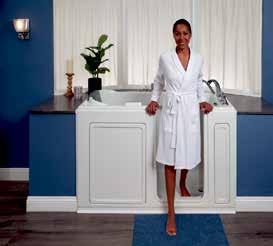
With millions of people nationwide filing for unemployment since the start of the COVID-19 pandemic, many individuals and families across the country are suddenly finding themselves without health insurance at a precarious time. Fortunately, new options may be able to help those on tight budgets.
“The sudden and unexpected loss of health insurance only compounds the stress caused by job loss amidst this unprecedented economic and public health crisis. However, unemployed individuals have more options for affordable health insurance than they did during past economic recessions thanks to provisions in the Affordable Care Act, along with actions recently taken by Congress and some states,” says American Medical Association (AMA) president, Patrice A. Harris, M.D.
Whether you recently lost your job-based health insurance or were uninsured before COVID-19 struck, the AMA, a longtime advocate for health insurance coverage for all Americans, is highlighting the following options: • Affordable Care Act (ACA) Marketplaces: Family and individual health plans can be bought in the health insurance marketplaces created by the ACA. Losing a job is a qualifying life event that allows unemployed individuals up to 60 days to enroll in a marketplace health plan before the close of a special enrollment period. Due to the COVID-19 pandemic, certain states have reopened enrollment periods when all consumers -- not only those who have experienced a job loss -- can enroll in marketplace health plans and potentially qualify for financial assistance to purchase these plans based on their income.
Subsidies available to eligible individuals through the health insurance marketplaces can help with premiums and out-of-pocket costs, making coverage more affordable. The Kaiser Family Foundation can help calculate an estimate of premiums and subsidies based on an individual’s income, age and family size. It will also estimate an individual’s eligibility for Medicaid. • Medicaid: While each state’s program has unique attributes for coverage, Medicaid can offer no- or low-cost coverage for those with the lowest incomes with limited cost-sharing requirements. Unlike the ACA marketplaces, there is no defined open enrollment period for Medicaid, and eligible people can sign up at any time. State eligibility requirements and income qualifications vary by state. Every state covers low-income children, pregnant women and people with disabilities, while 36 states and the District of Columbia have expanded Medicaid coverage so that adults with income up to 138 percent of the federal Discount applied at time of purchase. Terms and Conditions Apply. * Subject to 3rd party credit approval. Minimum monthly payments required. Receive a free American Standard Cadet Toilet with full installation of a Liberation Walk-In Bath, Liberation Shower, or Deluxe Shower. Offer valid only while supplies last. Limit one per household. Must be fi rst time purchaser. All offers subject to change prior to purchase. See www.AmericanStandardBathtubs.com for other restrictions and for licensing, warranty, and company information. * CSLB B982796; Suffolk NY:5543IH; NYC:HIC#2022748-DCA. Safety Tubs Co. LLC does not sell in Nassau NY, Westchester NY, Putnam NY, Rockland NY. ✓EXPERIENCE YOU CAN TRUST!
Only American Standard has OVER 140 years of experience and offers the Liberation Walk-In Bathtub. ✓SUPERIOR DESIGN!
Ultra low easy entry and exit design, wide door, built-in safety bar and textured oor provides a safer bathing experience. ✓PATENTED QUICK-DRAIN ®
TECHNOLOGY ✓LIFETIME WARRANTY!
The ONLY Lifetime Warranty on the bath AND installation, INCLUDING labor backed by American Standard. ✓44 HYDROTHERAPY JETS!
More than any other tub we’ve seen. WALK - IN BATHTUB SALE! SAVE $1,500
Lifetime Warranty! Finance Options Available * FREE!
An In-Home Evaluation Will Be Scheduled At Your Earliest Convenience
FREE!
Savings Include an American Standard Right Height Toilet FREE! ($500 Value)
855-419-3775 Or visit: www.walkintubinfo.com/harlem Limited Time Offer! Call Today!
Walk-In Tubs (Statepoint)
PHOTO SOURCE: (c) fizkes / iStock via Getty Images Plus
poverty level can qualify. • Beware Short-Term Plans: The AMA cautions patients to avoid shortterm limited duration plans whenever possible, especially during this pandemic. Short-term plans are designed to fill temporary gaps in health insurance when comprehensive coverage may not be an option. But it is important to understand that these plans offer very limited benefits and do not usually cover COVID-19 testing and treatment, preexisting medical conditions, mental health services, prescription drugs, and preventative and wellness care.
“Avoiding gaps in coverage should be a top priority for anyone who has recently lost their health insurance,” says Harris. “The COVID-19 pandemic has highlighted the importance of having meaningful health insurance coverage.”
IKEA RETAIL U.S. DONATES THOUSANDS OF GOODS TO QUEENS FAMILIES AT-RISK DURING COVID-19 CRISIS
Acting Queens Borough President Sharon Lee announced a partnership with IKEA Retail U.S. to provide thousands of products such as new bedding, towels and children’s items to Queens non-profit community-based organizations and shelters for distribution amongst families throughout the borough.
The contribution of IKEA goods is part of a nationwide initiative announced last week to donate $1.6 million worth of products and supplies to support communities around the country most severely impacted by the COVID-19 pandemic.
“Queens is proud to partner with IKEA and thanks them for this swift, generous donation of much-needed items to help families during the COVID-19 pandemic,” said Borough President LEE. “We are deeply grateful to our non-profit community partners for their brave, unwavering commitment to serve and protect the most vulnerable.”
“We recognize the role we can play in helping people during the COVID-19 crisis, and we are proud to support relief efforts in Queens with a donation of much-needed products including bedding and bath linens,” said IKEA Area Manager SHAHAB MOLLAEI. “As a company that cares deeply about people and the planet, our thoughts remain with those in the Queens community and elsewhere who are directly affected by the virus and those working tirelessly to help them.”
On Thursday, April 30, Borough President Lee facilitated the distribution of thousands of donated items to Queens CBOs or facilities serving at-risk populations, including: • 100 Suits for 100
Men in Jamaica • Briarwood Family
Residence in Briarwood • CORE Services
Group Beach House in Arverne • Forestdale, Inc. in
Forest Hills • Garden of Hope • Homes for the Homeless in Jamaica • Hour Children in
Long Island City • Korean American
Family Services
Center • LifeWay Network,
Inc. • Restful Nights Organization, Inc. in Jamaica • Safe Horizon • Transitional Services for New York, Inc. in
Jamaica • Voces Latinas in
Jackson Heights • Women for Afghan
Women • Womankind
The Port Authority of New York and New Jersey assisted with the
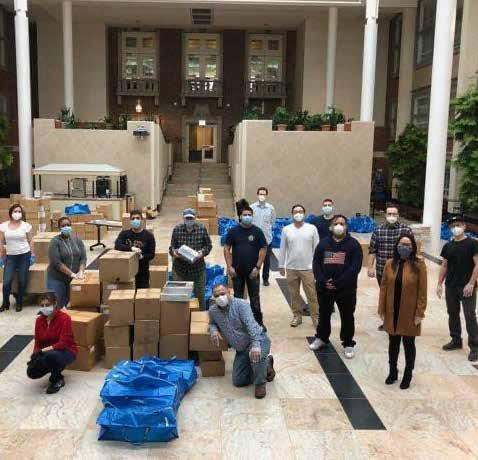
distribution of the donated IKEA items to CBOs.
The donated IKEA items include: • 864 bed spreads (57- 58 each) • 816 bed sheets (54- 55 each) • 1,920 wash cloths (128 each) • 1,440 hand towels (96 each) • 864 bath towels (57- 58 each) • 2,560 AAA batteries (170-171 each) • 1,260 AA batteries
Harlem Community Newspapers | May 14. 2020 5 (84 each) • 180 children’s train sets (12 each) • 96 children’s weaving looms (6-7 each) • 1,425 children’s mixed paint sets (94- 95 each) • 2,160 children’s paint brushes (144 each) • 444 packages of mixed paper (29-30 each) “The right gift at the right moment can have meaning for a lifetime. Forestdale is so grateful for this demonstration of compassion by IKEA. This generous gift will help hundreds of families who are struggling in the face of tragic losses and the hardship of lost wages,” said Forestdale, Inc. Executive Director BILL WEISBERG. “Families see that they can count on the broader community — companies like IKEA, leaders like Acting Borough President Sharon Lee, and Forestdale’s staff and supporters — for clothing, household items, food, and medical supplies. This donation of linens and towels from IKEA represents fewer things for families to worry about, and the toys for children are coming at a crucial time when they need entertainment and joy.”

